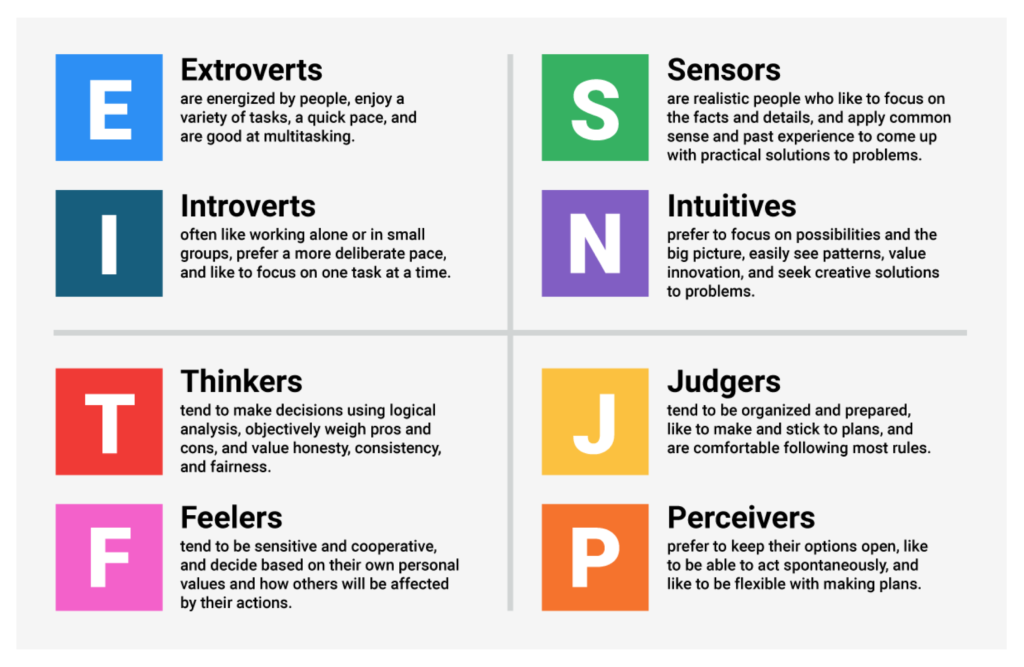Introduction
The Myers-Briggs Type Indicator (MBTI) is a widely recognized personality assessment tool that delves into an individual's psychological preferences across four main dichotomies: Extraversion vs. Introversion, Sensing vs. Intuition, Thinking vs. Feeling, and Judging vs. Perceiving. By analyzing an individual's inclinations in these four aspects, the MBTI generates a unique four-letter personality type. This type can offer valuable insights into strengths, weaknesses, communication styles, and decision-making approaches. Beyond personal development, the MBTI is extensively utilized in fields such as career counseling and organizational dynamics.
MBTI 16 Personalities Types and Relationship Compatibility
At the heart of the Myers-Briggs Type Indicator (MBTI) lies the intention to illuminate an individual's personality preferences and how they exert influence over behavior, communication patterns, and decision-making processes. By pinpointing an individual's inclinations within the four dichotomies, the MBTI unveils innate tendencies, strengths, as well as potential blind spots for personal development. This heightened self-awareness becomes a valuable asset in numerous scenarios, including shaping careers, fostering effective teamwork, navigating conflicts, and nurturing personal growth. Its broader application extends to promoting respect for diversity, enhancing communication, and encouraging collaboration in personal and professional interactions.
Cracking the Code of Each MBTI Letter
Extraversion vs. Introversion
Extraversion versus introversion revolves around the locus of an individual's attention and energy source. Extraverts thrive in social settings, drawing energy from interactions with others, while introverts recharge through solitude and introspection.
Sensing vs. Intuition
Sensing versus intuition pertains to how individuals absorb and process information. Sensing types rely on their five senses for factual data and live in the present, whereas intuitive types focus on patterns, possibilities, and future-oriented thinking.
Thinking vs. Feeling
Thinking versus feeling influences the decision-making process. Thinkers are analytical and rational, basing decisions on objective criteria, while feelers make choices based on personal values and emotional resonance.
Judging vs. Perceiving
Judging versus perceiving relates to how individuals engage with their external environment. Judgers appreciate structure and planning, seeking predictability, while perceivers embrace spontaneity and adaptability.
These four dichotomies collaborate to form distinct MBTI personality types. For instance, an ISTJ embodies introversion, sensing, thinking, and judging qualities, whereas an ENFP reflects extraversion, intuition, feeling, and perceiving traits.
Real-life manifestations of these dichotomies are evident in various scenarios. An extraverted individual may relish social gatherings, while an introvert prefers solitary or intimate interactions. A sensing person might meticulously follow a recipe, whereas an intuitive individual delights in culinary experimentation. Thinkers prioritize fact-based decisions, whereas feelers consider emotional ramifications. Judgers thrive in organized schedules, while perceivers embrace spontaneity.
Exploring MBTI Compatibility in Relationships
As the fascination with MBTI compatibility in relationships grows, questions about the best matches, most compatible types, and the potential for harmony arise. These inquiries lead to a quest for deeper understanding and a desire to navigate personal connections with greater insight. The concept of MBTI compatibility within relationships is multi-dimensional, encompassing friendship, romance, and partnership dynamics.
Incorporating the insights of the MBTI system into understanding personality types and relationship compatibility opens up a realm of possibilities. By exploring the intricacies of these four dichotomies, individuals gain tools to enhance communication, bridge differences, and foster meaningful connections in both personal and professional spheres. Whether one is embarking on a journey of self-discovery or seeking to strengthen relationships, the MBTI provides a roadmap to unlock the power of personality and navigate the diverse tapestry of human interaction.



